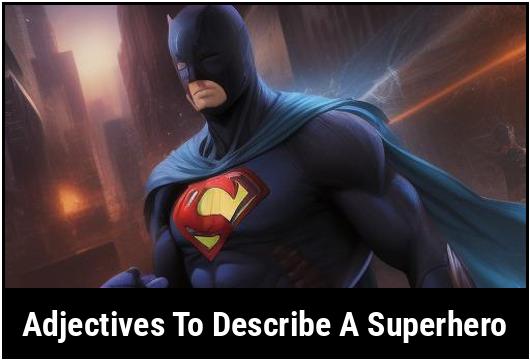- You are here:
- Home »
- adjectives
- » 31 Adjectives To Describe A Superhero

31 Adjectives To Describe A Superhero
When we think of a superhero, we often conjure up images of bravery, strength, and character. Superheroes are iconic figures in popular culture, and their portrayal often relies heavily on the adjectives used to describe them. Adjectives add depth and dimension to the characters, allowing us to form a vivid mental image of their abilities, personality, and impact. In this article, we will delve into the world of adjectives used to describe superheroes, examining the various types of adjectives that can be applied and how they contribute to shaping our perception of these extraordinary figures.
Key Takeaways
- Adjectives play a crucial role in creating a vivid and dynamic image of a superhero.
- Different types of adjectives can be used to describe a superhero’s physical attributes, superpowers, personality traits, and moral code.
- The careful selection of adjectives can enhance the character development and storytelling in superhero narratives.
Adjectives To Describe A Superhero
1. Mighty
Superheroes are often depicted as mighty, possessing immense strength and power. Their ability to overcome any obstacle makes them awe-inspiring and worthy of admiration.
2. Fearless
Fearlessness defines superheroes, as they consistently put their lives on the line to protect others. Their unwavering bravery in the face of danger is an inspiration to us all.
3. Courageous
Superheroes exhibit an unwavering courage that allows them to face their fears head-on. They serve as a reminder that bravery is not the absence of fear, but rather the ability to act despite it.
4. Unstoppable
Superheroes are unstoppable forces, defying all odds to achieve their goals. Regardless of the challenges they face, they persevere and never give up.
5. Compassionate
Beneath their powerful exteriors, superheroes possess a deep sense of compassion. They selflessly prioritize the well-being of others, showing empathy and care for those in need.
6. Determined
Superheroes demonstrate unparalleled determination and resolve. They set goals and relentlessly strive to achieve them, serving as a testament to the power of perseverance.
7. Inspiring
Superheroes inspire us to be the best versions of ourselves. They motivate us to believe in our abilities and ignite a spark of hope that we can overcome any obstacle.
8. Intelligent
Aside from physical attributes, many superheroes possess extraordinary intelligence. They utilize their sharp minds to solve complex problems and outsmart even the most cunning adversaries.
9. Resourceful
Superheroes are incredibly resourceful, making the most out of any situation. They find creative solutions to challenges, utilizing their environment and available tools to their advantage.
10. Tenacious
Superheroes display unwavering tenacity when faced with adversity. They refuse to back down, even when the odds seem insurmountable, inspiring us to persist in the face of difficulties.
11. Charismatic
Superheroes possess an undeniable charisma that draws people towards them. They have a natural ability to inspire others and lead with their powerful presence.
12. Altruistic
Altruism defines superheroes, as they consistently put others’ needs before their own. They embody the act of selfless giving, inspiring us to help those around us.
13. Noble
Superheroes possess a strong moral code, committing themselves to justice and righteousness. Their noble actions remind us of the importance of integrity and honor.
14. Invincible
Superheroes often seem invincible, as they emerge victorious against formidable foes. Their ability to defy the odds fuels our belief that anything is possible.
15. Agile
Superheroes display remarkable agility, effortlessly maneuvering through even the most challenging situations. Their nimbleness allows them to swiftly react and adapt to any circumstance.
16. Empowered
Superheroes have a unique ability to empower others. Their presence instills hope and confidence, inspiring individuals to tap into their own potential.
17. Charitable
Many superheroes engage in acts of charity, using their resources to make a positive impact on society. They remind us of the importance of giving back and helping those in need.
18. Enigmatic
Superheroes often possess an air of mystery that captivates our imagination. Their enigmatic nature adds an element of intrigue, making them even more fascinating.
19. Dynamic
Superheroes have dynamic personalities, showcasing different facets of their character. They possess depth and complexity, making them relatable and engaging.
20. Agile
Superheroes display remarkable agility, effortlessly maneuvering through even the most challenging situations. Their nimbleness allows them to swiftly react and adapt to any circumstance.
21. Inspirational
Superheroes serve as beacons of inspiration, motivating us to become better versions of ourselves. They remind us that we all have an inner hero waiting to emerge.
22. Indomitable
Superheroes possess an indomitable spirit, never allowing setbacks to deter them from their mission. Their unwavering resilience shows us the power of determination.
23. Gracious
Superheroes often exhibit grace and poise, even in the face of adversity. They maintain their composure, serving as role models for handling difficult situations with dignity.
24. Vigilant
Superheroes are vigilant protectors, always on the lookout for any signs of danger. Their keen senses enable them to detect threats that may go unnoticed by others.
25. Loyal
Superheroes are known for their unyielding loyalty to their comrades and the cause they fight for. They demonstrate the importance of standing by those we care about.
26. Selfless
Superheroes consistently prioritize the well-being of others over their own interests. Their selflessness demonstrates the importance of putting others first.
27. Wise
Many superheroes possess wisdom beyond their years, offering insightful guidance to those who seek it. Their wisdom serves as a beacon of light during times of uncertainty.
28. Swift
Superheroes possess incredible speed, allowing them to travel great distances in the blink of an eye. Their swiftness enables them to swiftly respond to emergencies.
29. Invigorating
Superheroes invigorate us with their boundless energy and enthusiasm. They remind us that life is meant to be lived to its fullest, inspiring us to embrace new adventures.
30. Iconic
Superheroes have become iconic figures in popular culture, with their images and symbols recognized worldwide. They have left an indelible mark on society, becoming timeless symbols of heroism.
31. Limitless
Superheroes represent limitless potential, showcasing that there are no boundaries to what we can achieve. They encourage us to push past our limitations and reach for greatness.
Why Use Adjectives To Describe A Superhero
Adjectives are an essential tool for storytellers and creators when fleshing out the characteristics of a superhero. They provide the audience with a nuanced understanding of the superhero’s abilities, personality, and ethos. By using adjectives, writers can evoke specific emotions, convey the magnitude of the superhero’s impact, and establish a vivid mental picture of the hero’s presence. Additionally, adjectives aid in differentiating various superheroes, as they are often distinguished by unique attributes and qualities. The judicious use of adjectives can elevate a superhero from a mere figure of power to a multi-dimensional and relatable character.
How To Choose The Right Adjective To Describe A Superhero
Selecting the right adjectives to describe a superhero requires a deep understanding of the character’s backstory, powers, and personality. It is crucial to consider the context in which the adjectives will be used and how they align with the overall narrative. Additionally, the adjectives should resonate with the audience and evoke the desired emotional response. The choice of adjectives can also be influenced by the genre and tone of the superhero narrative, whether it is gritty and realistic or fantastical and mythic. By carefully considering these elements, creators can effectively capture the essence of the superhero and convey it to the audience.
Types Of Adjectives For Describing A Superhero
Physical Attributes
Describing a superhero’s physical attributes is essential for painting a picture of their appearance and prowess. Adjectives such as "muscular," "lithe," "towering," "graceful," and "resilient" help convey the superhero’s physicality, agility, and strength.
Superpowers
Superheroes are often defined by their extraordinary abilities, and adjectives play a crucial role in articulating the nature and impact of these powers. Adjectives like "telekinetic," "invincible," "solar-charged," "molecular-manipulating," and "teleporting" illustrate the diverse and awe-inspiring range of superpowers that superheroes possess.
Personality Traits
Capturing the essence of a superhero’s personality is vital for creating a well-rounded and relatable character. Adjectives such as "charismatic," "enigmatic," "noble," "fearless," "tenacious," and "compassionate" shed light on the superhero’s demeanor, values, and moral compass.
Moral Code
Superheroes are often defined by their unwavering commitment to justice and righteousness. Adjectives like "upright," "unyielding," "righteous," "honorable," and "selfless" underscore the superhero’s dedication to upholding moral principles and serving as a beacon of hope.
In the realm of superhero storytelling, adjectives serve as a powerful tool for sculpting the larger-than-life figures that capture our imagination. From evoking the physicality of a superhero to conveying the depth of their moral character, adjectives enrich the portrayal of these iconic figures. By carefully choosing adjectives that align with a superhero’s traits and impact, creators can amplify the emotional resonance of their narratives and endow their superheroes with a sense of vitality and authenticity. In essence, adjectives are the building blocks that breathe life into superheroes, allowing audiences to connect with these larger-than-life champions on a profound and impactful level.
Examples Of Adjectives For Different Types Of Superhero
In the realm of storytelling and fictional worlds, superheroes have captured the hearts and imaginations of audiences worldwide. These extraordinary characters possess unique abilities, face daunting challenges, and inspire us with their courage and selflessness. When it comes to describing superheroes, one key tool that writers rely on is the effective use of adjectives. Adjectives are words that modify or provide additional information about nouns. They paint a vivid picture in the reader’s mind, bringing the superhero to life on the page.
Superheroes come in various forms, each with their own distinct traits and powers. Let’s take a look at some adjectives that can accurately describe different types of superheroes:
1. Physical Attributes:
- Muscular: Superman’s physique exudes strength and power.
- Agile: Spider-Man effortlessly moves with nimbleness and grace.
- Transformative: The Hulk’s appearance transforms from mild-mannered scientist to an enormous, green, and muscular behemoth.
- Stealthy: Batman’s ability to move silently and blend into the shadows makes him a formidable crime-fighter.
2. Personality Traits:
- Courageous: Wonder Woman fearlessly takes on any challenge that comes her way.
- Compassionate: Captain America’s unwavering compassion drives him to fight injustice and protect the vulnerable.
- Intuitive: Wolverine uses his instincts and sharp senses to navigate dangerous situations.
- Charismatic: Iron Man’s wit, charm, and confidence make him a captivating figure.
3. Powers and Abilities:
- Telepathic: Professor X possesses the power to read minds and communicate telepathically.
- Invincible: Thor’s hammer gives him invincibility and immense strength.
- Elastic: Mr. Fantastic’s ability to stretch his body into any shape or form helps him overcome obstacles.
- Immortal: Vampires like Blade have eternal life and incredible regenerative abilities.
4. Costume and Appearance:
- Sleek: Black Panther’s suit exudes a sleek and futuristic design.
- Dazzling: The Flash’s vibrant red and yellow costume captures attention and reflects his lightning-fast speed.
- Mysterious: Spawn’s dark and enigmatic appearance adds an air of mystery to his character.
- Flamboyant: Deadpool’s colorful and irreverent costume reflects his offbeat personality.
5. Fighting Style:
- Acrobatic: Nightwing incorporates acrobatics into his fighting style, combining elegance with efficiency.
- Fierce: Black Widow’s relentless and aggressive fighting technique overwhelms her opponents.
- Tactical: Captain Marvel’s strategic approach to combat allows her to anticipate and outmaneuver her adversaries.
- Martial Arts Master: Daredevil’s expertise in various martial arts disciplines enhances his crime-fighting abilities.
Common Mistakes In Using Adjectives To Describe Superheroes
While adjectives can be a useful tool in describing superheroes, it is essential to use them correctly to enhance your writing effectively. Here are some common mistakes to avoid:
1. Too Many Adjectives: Overloading a sentence with too many adjectives can overwhelm the reader and dilute their impact. Instead, choose a select few powerful and precise adjectives that capture the essence of the superhero you are describing.
Incorrect: The incredibly strong, fast, agile, and intelligent superhero fought the villain.
Correct: The powerful and agile superhero fought the villain with intelligence.
2. Vague Adjectives: Using vague or generic adjectives fails to paint a clear picture in the reader’s mind. It is crucial to choose specific and descriptive adjectives that provide a vivid depiction of the superhero’s characteristics.
Incorrect: The superhero was good.
Correct: The superhero was valiant, righteous, and heroic.
3. Redundancy: Avoid using adjectives that are redundant or repetitive. Instead, choose adjectives that add distinct and complementary information about the superhero.
Incorrect: The strong and powerful superhero saved the day.
Correct: The superhero’s strength and power allowed them to save the day.
4. Inconsistent Adjectives: Ensure consistency when describing a superhero throughout your writing. Switching between contradictory adjectives can confuse the reader and weaken their perception of the character.
Incorrect: The fierce and timid superhero faced the enemy with hesitation.
Correct: The fierce superhero faced the enemy head-on, without hesitation.
5. Lacking Variety: Using the same adjectives repeatedly can make the descriptions monotonous and unexciting. Explore a wide range of adjectives to create a diverse and captivating portrayal of the superhero.
Incorrect: The superhero was brave, brave, and brave.
Correct: The superhero demonstrated bravery, resilience, and fearlessness.
Using Adjectives Effectively
To make the most of adjectives when describing a superhero, follow these guidelines to effectively enhance your writing:
1. Be Specific: Choose adjectives that are specific, precise, and vivid. Instead of using general terms, seek out words that evoke clear imagery and convey the superhero’s unique qualities.
Incorrect: The superhero had a nice costume.
Correct: The superhero had an intricately designed and visually stunning costume.
2. Show, Don’t Tell: Instead of merely stating the superhero’s traits, engage the reader by demonstrating those qualities through actions, dialogue, or interactions with other characters. This approach allows the reader to experience the superhero’s attributes firsthand.
Incorrect: The superhero was kind.
Correct: The superhero selflessly saved a group of stranded civilians, displaying acts of kindness.
3. Use Metaphors and Similes: Metaphors and similes are powerful tools in describing superheroes. They create vivid comparisons that heighten the reader’s understanding and emotional connection to the character.
Incorrect: The superhero was fast.
Correct: The superhero moved like a streak of lightning, leaving a blur in their wake.
4. Consider the Context: When selecting adjectives for a superhero, consider their unique story, environment, and the world they inhabit. Adjectives that align with their background and purpose can provide deeper insight into their character.
Incorrect: The superhero was powerful.
Correct: The superhero’s immense power stemmed from the cosmic energy bestowed upon them by ancient gods.
5. Balance Strengths and Flaws: A well-rounded superhero has both strengths and flaws. Use adjectives that highlight their exceptional abilities while also acknowledging their limitations and vulnerabilities. This adds depth and complexity to the character.
Incorrect: The superhero had no weaknesses.
Correct: The superhero possessed incredible strength, but their impulsive nature often put them at risk.
Exercises And Practice
To improve your skills in using adjectives to describe superheroes, here are a few exercises to help you practice:
1. Character Analysis: Select a superhero of your choice and create a comprehensive list of adjectives that describe their physical appearance, personality traits, powers, costume, and fighting style. Challenge yourself to be creative and use varied and distinct adjectives.
2. Rewrite a Scene: Take a scene featuring a superhero and rewrite it, paying close attention to your use of adjectives. Experiment with different adjectives to intensify the emotions, atmosphere, and action in the scene. Compare your revised version to the original, noting the differences in impact.
3. Describe an Original Superhero: Imagine a completely original superhero and write a detailed description of their appearance, powers, and personality using a wide range of adjectives. Focus on creating a well-rounded character that resonates with readers.
4. Peer Feedback: Ask a fellow writer or friend to read your superhero description and provide feedback. Evaluate whether your adjectives effectively capture the essence of the character and make adjustments based on their suggestions.
Conclusion
Adjectives are a valuable tool in describing superheroes, enabling writers to create rich and engaging narratives. By using specific, vivid, and well-chosen adjectives, you can bring superheroes to life on the page, captivating readers with their unique qualities and abilities. Remember to avoid common mistakes such as redundancy, vagueness, and inconsistency, and strive for balance between strengths and flaws. Through practice and careful consideration, you can hone your skills in using adjectives to create captivating and memorable descriptions of superheroes.
FAQS On Adjectives To Describe A Superhero
What Are Some Powerful And Strong Adjectives To Describe A Superhero?
Some examples of powerful and strong adjectives for superheroes are fearless, invincible, unstoppable, mighty, and indestructible.
What Are Some Positive And Admirable Qualities Often Associated With Superheroes?
Positive and admirable qualities associated with superheroes include bravery, selflessness, compassion, determination, and leadership.
Can You Give Me Some Words To Describe A Superhero’s Physical Appearance?
Some words to describe a superhero’s physical appearance are muscular, toned, athletic, agile, and imposing.
How Can I Use Descriptive Adjectives To Create A Well-rounded And Multifaceted Superhero Character?
When creating a superhero character, it is important to use a combination of descriptive adjectives that showcase their physical abilities, personality traits, and moral values. This can include a mix of powerful words, positive qualities, and unique physical descriptors to craft a well-rounded and multifaceted character.








